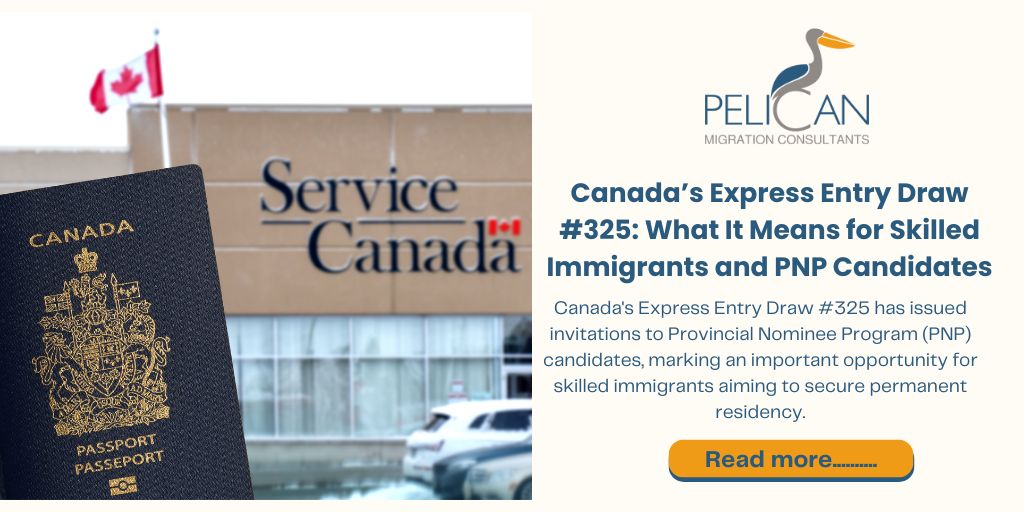
Canada’s Express Entry Draw #325: What It Means for Skilled Immigrants and PNP Candidates
In the latest move to enhance Canada's immigration strategy, Immigration, Refugees, and Citizenship Canada (IRCC) has issued invitations to apply (ITAs) for 174 candidates in the Provincial Nominee Program (PNP) stream through Express Entry Draw #325. This significant development brings new opportunities for skilled workers looking to immigrate to Canada. As Canada continues to refine its immigration policies, understanding how to navigate the PNP process can be crucial for your success.
Overview of Express Entry Draw #325
On November 18, 2024, IRCC conducted its Express Entry Draw #325, issuing 174 Invitations to Apply (ITAs) to candidates who are part of the Provincial Nominee Program (PNP) stream. The draw had a minimum Comprehensive Ranking System (CRS) score of 816, marking it as one of the smallest PNP draws of the year. This draw follows closely on the heels of a larger one, where 1,933 ITAs were issued across various categories, including Canadian Experience Class (CEC) and other PNP candidates.
Although this was a smaller draw, it still reflects Canada’s commitment to attracting skilled immigrants who can help meet regional labor demands. By issuing invitations to PNP candidates, the government continues to prioritize skilled workers who can fill labor shortages in specific provinces. For these candidates, the PNP provides a powerful route to Canadian permanent residency, particularly for those with the right skills and experience.
What is the Provincial Nominee Program (PNP)?
The Provincial Nominee Program (PNP) is one of the main avenues for skilled immigrants to gain Canadian permanent residency. It allows individual provinces and territories to nominate individuals based on their specific labor market needs. For instance, a province like Ontario may prioritize technology professionals, while Alberta may focus on skilled tradespeople.
Candidates who are nominated by a province receive an additional 600 points towards their Comprehensive Ranking System (CRS) score, significantly boosting their chances of being invited to apply for permanent residency. This program is particularly valuable for those who may not meet the CRS cutoffs for the Federal Express Entry stream but have the skills that are in demand in specific regions of Canada.
Through PNPs, Canada aims to address regional labor shortages by attracting talent that will support the growth of local economies. The program also offers tailored immigration opportunities for individuals who meet the needs of specific communities, making it a highly strategic option for many immigrants.
The CRS Cutoff and Its Importance
The Comprehensive Ranking System (CRS) score plays a pivotal role in the Express Entry system. It is a points-based system that assesses candidates based on factors like age, work experience, education, and language proficiency. The higher a candidate’s CRS score, the better their chances of receiving an ITA.
In Express Entry Draw #325, the minimum CRS score required for PNP candidates was 816, which is notably high compared to other draws. However, those with a PNP nomination automatically gain an extra 600 points, which is why their scores are higher. This makes the PNP an invaluable pathway for skilled workers looking to immigrate to Canada.
For candidates without a PNP nomination, achieving a high CRS score can be challenging, especially with the increasing competition. Nevertheless, candidates can improve their CRS score through various means, such as gaining additional work experience, improving language proficiency, or pursuing further education.
Canada's Immigration Targets for 2025 and What It Means for PNP Candidates
Looking ahead, Canada has set ambitious immigration targets for 2025, including welcoming a substantial number of Express Entry candidates. The country aims to admit over 124,000 Express Entry applicants next year, with a focus on those who possess skills needed to meet labor market demands.
The Canadian government has outlined specific immigration categories, including those under the PNP, Canadian Experience Class (CEC), and Federal Skilled Worker Program (FSWP). A notable priority for 2025 will be targeting high-demand professional occupations, such as healthcare workers, skilled tradespeople, and tech professionals.
Additionally, Canada is placing a greater emphasis on Francophone immigration, especially outside Quebec, to help foster a more bilingual and diverse population. This shift reflects Canada’s commitment to improving its economic growth by diversifying its workforce and supporting local communities with skilled workers.
5 Ways Pelican Migration Consultants Can Help You Navigate the PNP Process:
- Personalized Immigration Strategy: We tailor our advice to your specific qualifications, experience, and the province’s labor needs to ensure you have the best chance of obtaining a PNP nomination.
- Step-by-Step Guidance Through the Application Process: From preparing documents to submitting your PNP application, our consultants provide detailed support to ensure that every step is completed correctly.
- Maximizing Your CRS Score: Our experts help you explore strategies to boost your CRS score, such as improving language proficiency or gaining additional work experience.
- Streamlined Communication with Provincial Authorities: Pelican Migration Consultants help you liaise with provincial immigration authorities, ensuring that your application is processed efficiently and effectively.
- Ongoing Support and Updates: Stay updated with the latest changes to Canada’s immigration system, including Express Entry draws, provincial immigration criteria, and processing times, with our continuous support.
FAQs About Canada’s PNP Process:
- What is the Provincial Nominee Program (PNP)? The PNP allows provinces and territories in Canada to nominate individuals for permanent residency based on local labor market needs.
- How does a PNP nomination affect my CRS score? A PNP nomination adds 600 points to your CRS score, increasing your chances of receiving an Invitation to Apply (ITA) for permanent residency.
- What is the minimum CRS score for a PNP candidate? The minimum CRS score for a PNP candidate can vary depending on the draw. For Express Entry Draw #325, it was 816.
- How can I improve my CRS score for the PNP? You can improve your CRS score by gaining more work experience, improving your language test scores, or obtaining a provincial nomination.
- Can I apply for the PNP without a job offer? Yes, you can apply for a PNP without a job offer if you meet the specific qualifications and criteria of the province you're applying to.
How Pelican Migration Consultants Can Assist You in Migrate to Canada:
At Pelican Migration Consultants, we specialize in helping skilled professionals navigate the complexities of Canada’s immigration system, especially through the Express Entry and PNP. Our team of experts provides comprehensive support at every stage of your immigration journey, from assessing your eligibility for provincial nomination to submitting your application and securing your permanent residency. With a proven track record and deep understanding of Canadian immigration policies, we are committed to helping you achieve your dream of living and working in Canada. Let us help you make the process seamless and successful. Reach out today for a consultation!


